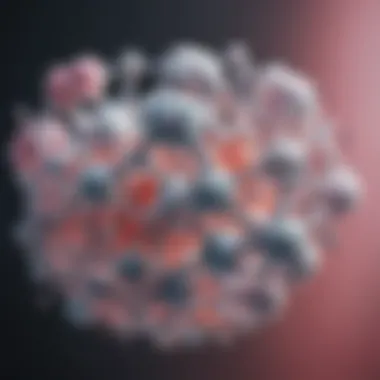Calcium's Role in Breast Cancer Risk: An Analysis


Intro
Calcium plays a vital role in various bodily functions, including cellular signaling and bone health. However, its implications in breast cancer risk are a subject of growing interest in the scientific community. This article provides a deep exploration of the nuances involved in calcium intake and breast cancer risk. By analyzing research studies, biological mechanisms, and dietary recommendations, we aim to unveil the complexities surrounding this relationship. Understanding these connections is crucial for developing effective prevention strategies and making informed dietary choices.
This discussion will encompass recent advances in the field, including the latest discoveries that shed light on how calcium influences breast cancer development and progression.
Prolusion to Calcium and Breast Cancer
Calcium plays a vital role in the human body, impacting various biological functions. Its relationship with breast cancer has become a focal point for researchers and medical professionals. Understanding how calcium intake influences breast cancer risk can lead to informed dietary recommendations and potential preventive measures.
The exploration of calcium's implications in breast cancer encompasses a multidimensional approach. First, it examines the biological mechanisms involved in calcium metabolism and cellular functions. Significant insight comes from studying how calcium is integrated in cell signaling pathways, which could play a direct role in tumor development or suppression.
Second, a comprehensive review of statistics reveals the prevalence and incidence of breast cancer within diverse populations. These statistics serve not only as a backdrop for understanding the urgency of breast cancer research but also help identify at-risk groups. By mapping the intersection of dietary habits and the incidence of breast cancer, we can highlight crucial patterns that call for attention from both healthcare providers and patients.
This article aims to clarify the implications of calcium in the context of breast cancer. The goal is to synthesize existing research and provide an informed basis for dietary choices related to calcium consumption. Moreover, understanding this relationship signifies broader public health implications, which can empower individuals to make educated dietary decisions.
Understanding Calcium: An Essential Mineral
Calcium is a crucial mineral in the human body, fundamental for the development and maintenance of bone health, muscle function, and neural communication. The human skeleton serves as a reservoir for calcium, providing a system for regulation through various bodily processes. Additionally, calcium participates in enzymatic reactions and hormone secretion, emphasizing its critical role in overall health.
Most people obtain calcium primarily through dietary sources. Foods high in calcium include dairy products like milk, yogurt, and cheese. Non-dairy options such as leafy green vegetables, fortified plant-based milks, and tofu also contribute to calcium intake. Despite its importance, many individuals do not meet the recommended dietary allowances for calcium, which can have consequences for bone health and possibly extend to cancer risk.
Breast Cancer: Statistics and Overview
Breast cancer remains a prominent public health concern, affecting millions of women worldwide. According to the World Health Organization, breast cancer is the most commonly diagnosed cancer among women. The American Cancer Society reports that one in eight women will be diagnosed with breast cancer in their lifetime.
The statistics underscore the necessity for ongoing research into prevention methods, including dietary modifications. While the precise etiology of breast cancer is complex, various lifestyle factors, including nutrition, have been shown to influence risk. Studies suggest that dietary patterns, genetics, and environmental factors contribute to breast cancer development, making this a multifaceted issue that warrants special examination.
"Understanding the links between nutrition and breast cancer risk can inform public health strategies and individual dietary choices."
Biological Mechanisms Linking Calcium and Breast Cancer
The intersection between calcium and breast cancer risk encompasses several intricate biological processes. Understanding these mechanisms is vital for dissecting how calcium impacts breast cancer development and progression. This section unpacks key elements that highlight calcium's role in cellular function, illustrating not just a nutritional component but as a potential modifier of cancer dynamics.
Calcium's Role in Cell Signaling
Calcium serves as a crucial second messenger in various signaling pathways. In the context of cell signaling, its concentration within cells undergoes fluctuations that directly influence cellular responses to external stimuli. This is particularly relevant in breast tissue, where aberrations in calcium signaling can lead to uncontrolled cell proliferation—a hallmark of cancer.
Studies indicate that calcium ions facilitate the activation of specific cellular pathways involved in cell division, apoptosis, and differentiation. For instance, molecules such as protein kinase C are activated by calcium ions. Overactive signaling due to excessive calcium levels can contribute to oncogenesis, suggesting that maintaining calcium homeostasis is pivotal for cellular health.
Calcium Homeostasis and Tumor Growth
Calcium homeostasis refers to the regulation of calcium levels within the body, essential for various physiological functions. Any disruption in this balance may foster a conducive environment for tumor growth. Research highlights that cancer cells often exhibit altered calcium handling compared to normal cells. These changes can promote proliferation, invasion, and metastasis.
Furthermore, studies show that calcium-sensing receptors play a significant role in modulating growth factor signaling pathways. The interaction between elevated extracellular calcium levels and these receptors can lead to enhanced cancer cell survival. It becomes increasingly clear that aberrations in calcium homeostasis are not merely coincidental but may actively contribute to cancer progression, particularly in breast cancer.


Apoptosis and Calcium Regulation
Apoptosis, or programmed cell death, is a critical mechanism by which the body eliminates potential cancerous cells. Calcium plays a dual role in this process; while normally it can trigger apoptosis when levels are appropriate, dysregulation can have the opposite effect. Elevated calcium levels can inhibit apoptosis, allowing malfunctioning cells to survive longer than they should.
Research indicates that dysregulated calcium levels can disrupt apoptotic signaling pathways, leading to resistance against cell death. When cancer cells evade apoptosis, they can accumulate further mutations, enhancing their potential for malignancy. On the other hand, restoring normal calcium levels could reactivate these pathways, providing insights into innovative treatment strategies aimed at reinstating the natural apoptotic process.
Empirical Studies on Calcium and Breast Cancer Risk
Empirical studies play a crucial role in understanding the relationship between calcium intake and breast cancer risk. These investigations offer insights into patterns of calcium consumption and their correlation with the incidence of breast cancer among different populations. By analyzing diverse data sources, researchers can identify possible links and provide evidence for dietary recommendations. The importance of empirical studies lies in their ability to combine statistical analysis with biological understanding, facilitating informed discussions regarding public health initiatives.
Epidemiological Evidence
Epidemiological evidence gathers information from populations to study health-related occurrences and their risk factors. Various cohort and case-control studies have focused on calcium intake and breast cancer risk. For instance, a large prospective study conducted in the United States revealed that higher calcium consumption may correlate with a reduced risk of certain breast cancer types. The sample size and demographic diversity in these studies enhance the reliability of their findings.
However, while these studies suggest a protective effect, they also come with limitations. For example, variations in dietary reporting, genetic predispositions, and lifestyle factors can affect results. Therefore, it is essential to evaluate these studies critically and consider other risk factors influencing breast cancer outcomes.
Clinical Trials and Findings
Clinical trials are often seen as the gold standard for establishing causation between dietary components and health outcomes. Several clinical trials have examined the influence of calcium supplementation on breast cancer risk. In one notable trial, premenopausal women receiving a daily calcium supplement showed no significant difference in breast cancer incidence compared to the placebo group. This result indicates that calcium, while essential for bone health, may not have the anticipated direct impact on breast cancer development.
Additionally, some trials have suggested that specific patient populations, such as postmenopausal women, could react differently to calcium supplementation. As these findings emerge, more targeted research is needed to delineate the relationship clearly.
Meta-Analyses: Summary of Results
Meta-analyses compile data from multiple studies to provide a comprehensive overview of research findings. In examining the impact of calcium on breast cancer risk, several meta-analyses indicate that the evidence is mixed. Some analyses support the notion that calcium intake may have a modest protective effect against certain breast cancer types. Conversely, others suggest insufficient evidence to draw definitive conclusions. The discrepancies in results highlight the complexity of nutritional science as it interacts with various factors, such as genetic makeup and overall dietary patterns.
In summary, meta-analyses contribute a valuable perspective by aggregating findings, offering a broader understanding of calcium's implications in breast cancer risk. The critical takeaway is that while calcium is essential for health, its role in breast cancer prevention warrants further investigation, taking into account varying evidence and the individual nuances of different patient populations.
Nutritional Aspects of Calcium
Calcium is not only a vital mineral for bone health but also plays a significant role in other bodily functions. Understanding the nutritional aspects of calcium in relation to breast cancer risk is crucial. Calcium's involvement in cellular mechanisms makes it a topic of interest in cancer prevention and overall health.
Dietary Sources of Calcium
Calcium can be obtained from various dietary sources. Some of the best sources include dairy products like milk, cheese, and yogurt. These provide highly absorbable forms of calcium. However, for those who are lactose intolerant or prefer plant-based options, several alternatives exist. Leafy green vegetables such as kale and bok choy offer calcium along with other essential nutrients. Fortified products, including certain types of tofu and plant-based milk, also contribute to calcium intake.
Additionally, fish with edible bones, such as sardines and canned salmon, can enhance calcium levels in the diet. It is essential to consider a balanced intake, as reliance on one source may not meet nutritional needs effectively.
Calcium Supplementation: Benefits and Risks
Calcium supplementation is a topic of ongoing debate. On one hand, it offers benefits for individuals who do not get enough calcium from their diets. Supplements can aid in meeting daily calcium requirements, especially for older adults and those with certain dietary restrictions. However, there are risks associated with excessive supplementation.
Research indicates that high doses of calcium supplements might be linked to increased cardiovascular risks. It is essential to consult healthcare professionals before starting any supplementation to assess individual needs and avoid potential adverse effects. Nutrition from food sources is generally preferred, as it involves a balanced intake of other nutrients.
Recommended Dietary Allowance for Calcium


The Recommended Dietary Allowance (RDA) for calcium varies by age and gender. For most adults, the RDA is about 1,000 milligrams per day. Women over 50 and men over 70 may require 1,200 milligrams daily. It is vital to ensure adequate intake to support bone health and possibly reduce the risk of breast cancer.
The body's need for calcium is not just about quantity but also about balance with other nutrients such as magnesium and vitamin D, which play roles in calcium absorption and metabolism.
Maintaining the appropriate calcium intake is important for overall health and could have implications on breast cancer risk. Thus, aligning dietary habits with the RDA is highly recommended. By emphasizing nutrient-rich food sources, individuals can better support their health outcomes.
Potential Confounding Factors in Research
Understanding the potential confounding factors in research surrounding calcium intake and breast cancer risk is essential for drawing accurate conclusions. These factors can obscure the true relationship between dietary habits and health outcomes. By examining elements like dietary patterns, genetic predispositions, and interactions with other nutrients, researchers can better understand how calcium may influence breast cancer.
Dietary Patterns and Lifestyle Choices
Dietary patterns and lifestyle choices are crucial components that researchers must consider. People consuming high amounts of calcium often have specific diets rich in dairy or fortified foods. This dietary habit might also correlate with other health behaviors, such as exercising regularly or avoiding smoking, both of which can affect cancer risk.
For instance,
- A diet rich in fruits and vegetables may provide protective effects against breast cancer.
- Individuals who consume high levels of calcium might also be less likely to consume processed foods, which can negatively impact health.
Thus, it’s vital to analyze whether calcium itself contributes to reducing breast cancer risk or if it is merely a marker for healthier overall dietary practices.
Genetic Factors and Breast Cancer
Genetic factors play a significant role in breast cancer risk. Some individuals may have hereditary predispositions that increase the likelihood of developing this disease, regardless of their dietary habits. For example, mutations in the BRCA1 or BRCA2 genes significantly heighten breast cancer risk.
If research fails to account for these genetic factors, it may lead to misleading conclusions about calcium intake. Addressing genetic predispositions when studying calcium's effect on breast cancer is therefore crucial. Some potential genetic interactions include:
- Variations in calcium absorption and metabolism.
- Genetic markers indicating higher susceptibility to cancer, potentially skewing outcomes in studies linking calcium levels to cancer risk.
Other Nutrients Interacting with Calcium
Calcium does not exist in a vacuum—its effects on breast cancer can also depend on interactions with other nutrients. For instance, vitamin D is known to play a role in calcium absorption and has been explored for its potential to lower breast cancer risk. The interaction of these nutrients could potentiate or negate the protective aspects of calcium.
Other nutrients that may interact include:
- Magnesium: Involved in bone health, but also in cancer prevention.
- Phosphorus: High levels may affect calcium balance and therefore influence health outcomes.
Research should aim to discern how these interactions affect overall breast cancer risk. \nBy focusing on these confounding factors, we can generate a clearer understanding of the relationship between calcium and breast cancer. This will enhance public health guidance and influence dietary choices effectively.
Public Health Implications
Understanding the relationship between calcium intake and breast cancer risk not only advances scientific knowledge but also possesses significant public health implications. Adequate calcium consumption is a critical aspect of nutrition, yet its association with cancer prevention remains a complex subject. In light of ongoing research, it is vital to integrate these findings into public health initiatives to optimize health outcomes for various populations.
Public health strategies must prioritize calcium recommendations that consider its potential role in reducing the risk of breast cancer. This is important for multiple reasons:
- Guided Dietary Choices: Establishing clear calcium intake guidelines can empower individuals to make informed dietary choices. This could lead to improved calcium levels in populations, which may contribute to reduced cancer risks.
- Preventative Health: Emphasizing calcium's role in cancer prevention could reshape health messaging. Public health campaigns that focus on nutrition may enhance awareness of healthy dietary patterns that incorporate sufficient calcium.
- Resource Allocation: Understanding the implications of dietary calcium on breast cancer risk can aid in the allocation of health resources. For instance, increasing access to calcium-rich foods in communities could serve as a preventive measure.


"The link between nutrition and cancer prevention underscores the critical need for public health policies that promote healthy eating habits."
Addressing calcium in guidelines and public health messages requires ongoing research and analysis to adapt these recommendations to new findings. The complexity of various factors, including genetics and dietary patterns, necessitates a nuanced approach to policy formation. Ultimately, significant advancements in public health could emerge from clarifying calcium's role in breast cancer prevention.
Calcium Recommendations in Cancer Prevention Guidelines
In light of the evolving science surrounding calcium and breast cancer, it is essential to outline clear recommendations. Organizations like the World Health Organization and the American Cancer Society provide guidelines that suggest appropriate levels of calcium intake. These recommendations are shaped by the latest research to reflect both preventative benefits and risks associated with calcium consumption. As part of holistic cancer prevention strategies, it is advisable for women, particularly those at higher risk, to maintain adequate calcium levels.
Educational Initiatives and Awareness
Educational initiatives play a crucial role in disseminating information about calcium and breast cancer risk. Public campaigns that target women’s health can elevate understanding of the importance of calcium in their diet.
- Workshops and Seminars: Hosting community workshops can facilitate discussions on nutritional literacy related to calcium intake.
- Online Resources: Utilizing digital platforms to spread awareness can reach a broader audience. Informational articles, infographics, and courses about healthy eating can empower individuals.
- Partnership with Healthcare Providers: Collaboration between public health officials and health practitioners can foster personalized dietary advice related to cancer prevention.
Addressing the topic of calcium in relation to breast cancer can thus promote not only better awareness but also foster healthier communities. Teaching individuals about the necessity and sources of calcium forms a foundational step toward implementing effective prevention measures.
Future Directions in Research
Research into the connections between calcium intake and breast cancer risk continues to evolve. Understanding this relationship is crucial. By delving deeper, we can uncover how calcium affects breast cancer at various biological levels. New studies might illuminate pathways not yet discovered. This section will highlight emerging research areas and potential advances that can change the landscape of treatment and prevention.
Emerging Research Areas
Some research areas show promise regarding calcium's role and its implications for breast cancer. One of these areas is the role of calcium in genomic stability. It is theorized that calcium may help maintain the integrity of DNA. If this proves correct, it could lead to new strategies for preventing cancer.
Another area of interest is the interplay between calcium and vitamin D. Some studies suggest that the interaction of these nutrients could potentially modulate breast cancer risk. More research, particularly in clinical settings, can clarify whether increasing vitamin D alongside calcium may reduce risk.
Also intriguing is the relationship between calcium intake and the gut microbiome. Our understanding of how gut health influences cancer development has expanded. Researching how calcium affects gut flora could provide insights into prevention strategies.
Furthermore, population studies in diverse demographics are needed. Different ethnic and racial groups may respond differently to calcium intake. Tailoring recommendations based on genetic and environmental factors could enhance prevention measures.
Potential Advances in Treatment and Prevention
As researchers explore calcium's influence on breast cancer, potential advances in treatment and prevention emerge. One possibility is developing calcium-based therapies. For instance, specific calcium compounds could be used to target cancer cells more effectively. Research is still in the early stages. However, this might lead to novel treatment protocols in the future.
Additionally, refining dietary recommendations can play a significant role in prevention. Understanding how much calcium is beneficial for different populations is vital. Recommendations could shift towards more personalized nutrition plans, incorporating genetic and lifestyle factors.
The advent of technology also opens new avenues. Biomarkers related to calcium metabolism could lead to improved screening methods. If research can identify who is most at risk due to calcium imbalance, preventive strategies could become much more precise.
As research continues, there is hope that the understanding of calcium's role in breast cancer prevention and treatment will become clearer, guiding more effective strategies.
In summary, navigating the future of calcium research and its implications in breast cancer offers significant opportunities. By focusing on emerging areas and potential treatment advancements, we not only deepen our understanding but also pave the path towards better prevention and intervention strategies.
Epilogue
The conclusion of this article serves as an essential synthesis of the intricate relationship between calcium and breast cancer. Understanding how calcium interacts with cellular processes offers significant implications for both individual health and broader public health initiatives. The findings emphasize the need for a balanced perspective on calcium intake, integrating its potential benefits with caution regarding excessive consumption.
Summary of Findings
Throughout the article, key points about the role of calcium in breast cancer risk have been highlighted. Studies show a nuanced relationship, where adequate calcium intake may support cellular health and potentially lower breast cancer risk. However, this relationship is complex, influenced by dietary patterns, genetic factors, and interactions with other nutrients. A comprehensive understanding of these elements can help individuals make informed dietary choices.
"Nutritional choices play a crucial role in cancer prevention strategies."















